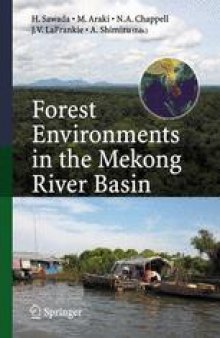 جزییات کتاب
جزییات کتاب
Deforestation and forest degradation have continued over a long period of time, and the deterioration of forest environment management services is becoming one of the biggest concerns in the world. Especially in large continental river basins, sel? sh political attitudes and individual interests in some regions predispose other regions to problems downstream and bring about international issues. The Mekong is just such a river basin and its water is the most important resource, interdependent with the forest conditions in the region. The lives of millions of people are sustained by the water of the Mekong River, and mutual understanding on water resource mana- ment is essential in this region. Consequently, appropriate environment management to control water resources is required of each country along with scienti? c knowledge of forest management, including forest hydrology. The Mekong River Commission (MRC) was established in 1995 to jointly manage shared water resources and develop the economic potential of the river by the gove- ments of Cambodia, Laos, Thailand, and Vietnam. However, very limited operational forest management for water resources is being conducted based on reliable sources of information. International cooperation in science and technology has progressed in Southeast Asia. One such activity, the research project “Changes of Water Cycle in the Mekong River Basin” (CWCM), has been conducted by the Forestry Administration (FA) of Cambodia, the Forestry and Forest Products Research Institute (FFPRI) of Japan, and several universities, since 2002.



 دانلود کتاب
دانلود کتاب

 جزییات کتاب
جزییات کتاب





 این کتاب رو مطالعه کردید؟ نظر شما چیست؟
این کتاب رو مطالعه کردید؟ نظر شما چیست؟
